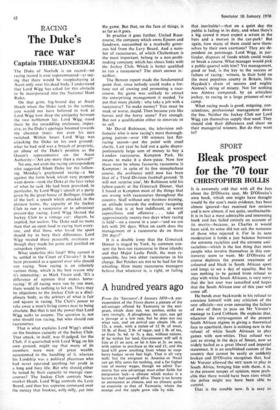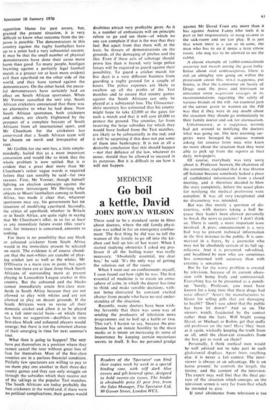SPORT
Bleak prospect for the '70 tour
CHRISTOPHER HOT LIS It is extremely odd that with all the fuss about the D'Oliveira case, Mr D'Oliveira's own book, which one might have thought would be the case's main evidence, has been almost ignored—has received few reviews and is now almost, if not quite, unobtainable. It is in fact a most admirable and interesting book and has failed entirely on account of its merits—because, as Charles 11 would have said, its sense did not suit the nonsense of those who rejected it. For in its sane moderation it holds a just balance between the extreme racialists and the extreme anti- racialists—which is the last thing that most people who involve themselves in this con- troversy seem to want. Mr D'Oliveira of course deplores the present treatment of coloured and black in South African sport and longs to see a day of equality. But he sees nothing to be gained from refusal to play with white South Africans, is very sorry that the last tour was cancelled and hopes that the South African tour of this year will come off.
He bends over backwards in his refusal to associate himself with any criticism of the mcc officials—not even censuring the failure of two of them to pass on Mr Vorster's message to Lord Cobham. He explains that, whatever the extravagances of the present South African regime in giving a theoretical face to apartheid, there is nothing new in the refusal of white South Africans to play games with non-whites. That refusal was just as strong in the days of Smuts, now so widely hailed as a great liberal and imperial statesman. It is an established custom of the country that cannot be easily or suddenly broken and D'Oliveira recognises that, had
Mr Vorster allowed the MCC team to play in
South Africa, bringing him with them, it is, in the present temper of opinion, most prob- able that there would have been riots which the police might not have been able to control.
That is the trouble now. It is easy to opportion blame for past errors, but, granted the present situation, it is very difficult to know what outcome from the im- passe is possible. The demonstrators in this country against the rugby footballers have up to a point had a very substantial success. It may be that the small number of physical demonstrators have done their cause more harm than good. To many people, hooligan brawling against a perfectly legal football match is a greater (or at least more evident) evil than apartheid on the other side of the world, and they have turned against the demonstrators. On the other hand, the peace- ful demonstrators have certainly had an effect on South African sportsmen. When Mr Vorster cancelled the !ACC trip, South African cricketers announced that there was no alternative to what he had done. Now South African sportsmen, both cricketers and others, are clearly frightened by the prospect of a complete boycott of South Africans from all international sport, and Mr Cheetham for the cricketers has annonnced that a South African team will be chosen on merit and irrespective of race.
Mr Griffith for the 'vim has, a little simple- mindedly, hailed this as a most important concession and would like to think that the whole problem is now settled. But it is evident that a great deal more than Mr Cheetham's rather vague words is required before that can sensibly be said—for two reasons. First, Mr Vorster, though himself fighting an election campaign against the even more intransigent Mr Hertzog who objects to Maori footballers coming to South Africa, has made it clear that, whatever sportsmen may say, his government has no intention of modifying apartheid. Secondly, the critics of apartheid, whether in Britain or in South Africa, are quite right in saying that Mr Cheetham's offer, in so far at least as any immediate future event (this year's tour, for instance) is concerned, amounts to nothing.
For there is no possibility that any black or coloured cricketer from South Africa would in the immediate present be selected on merit. The evidence is of course abund- ant that the non-whites are capable of play- ing cricket just as well as the whites. Mr D'Oliveira is a main case in point, but apart from him there are at least three black South Africans of outstanding merit at present playing in Lancashire League cricket in this country. But the coloured and the blacks cannot immediately attain first-class stan- dards in South Africa because they are not allowed to play with whites and are not allowed to play on decent grounds. If the South Africans were to revise all their domestic cricket and allow it to be played on a full inter-racial basis—of which there has been no suggestion—doubtless in time first-class black and coloured players would emerge; but there is not the remotest chance of their emerging in time for next summer's tour.
What then is going to happen? The mcc have put themselves in a position where they cannot cancel the tour without great loss of face for themselves. Most of the first-class counties are in a parlous financial condition. Pitifully few spectators are willing to pay to see them play one another in their three-day county games and they can only struggle on through the subsidies which they receive out of the takings at the popular Test matches. The South Africans are today probably the best cricketers in the world and, if there were no political complications, their games would doubtless attract very profitable gates. As it is, a number of enthusiasts will on principle refuse to go and see them—of which no one can complain if that is the way that they feel. But apart from that there will, at the least, be threats of demonstrations on the grounds, of the damaging of pitches and the like. Even if these acts of sabotage should prove less than is feared, very large police forces will be required to guard against their possibility. To guard a cricket match for five days is a very different business from guarding a rugby ground for a couple of hours. The police expenses are likely to swallow up all the profits of the Test matches and to ensure that county games against the South Africans can only be played at a substantial loss. The Gloucester- shire secretary has estimated that his county might hope to take £2,000 at the gates for such a match and that it will cost £6,000 to protect the ground. The counties, far from receiving the large subsidies for which they would have looked from the Test matches, are likely to be substantially in the red; and it will be surprising if this does not put some of them into bankruptcy. It is not at all a desirable conclusion that this should happen —nor that defiance of the law, whatever its cause, should thus be allowed to succeed in its purposes. But it is difficult to see how it will not happen.



































 Previous page
Previous page